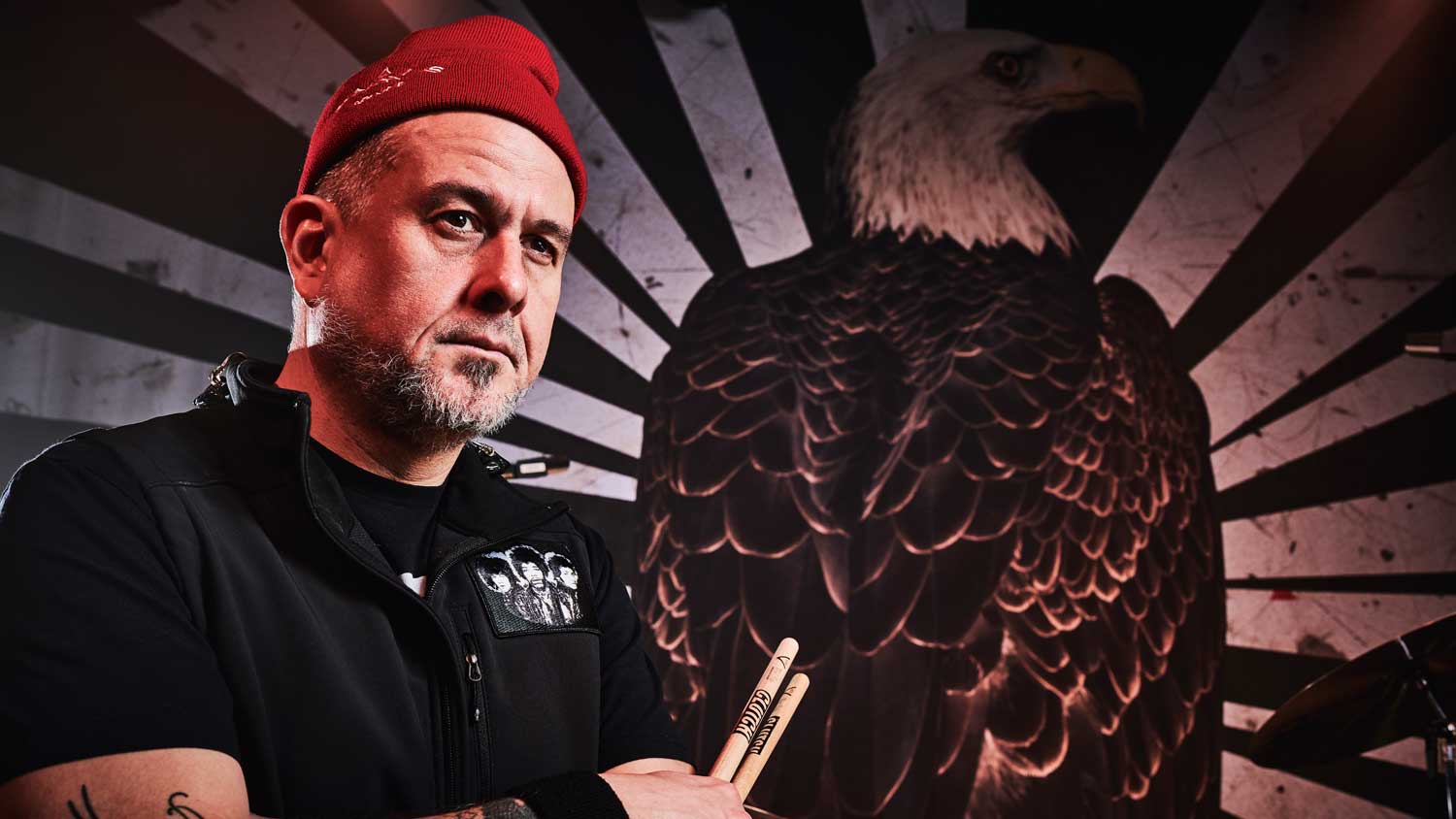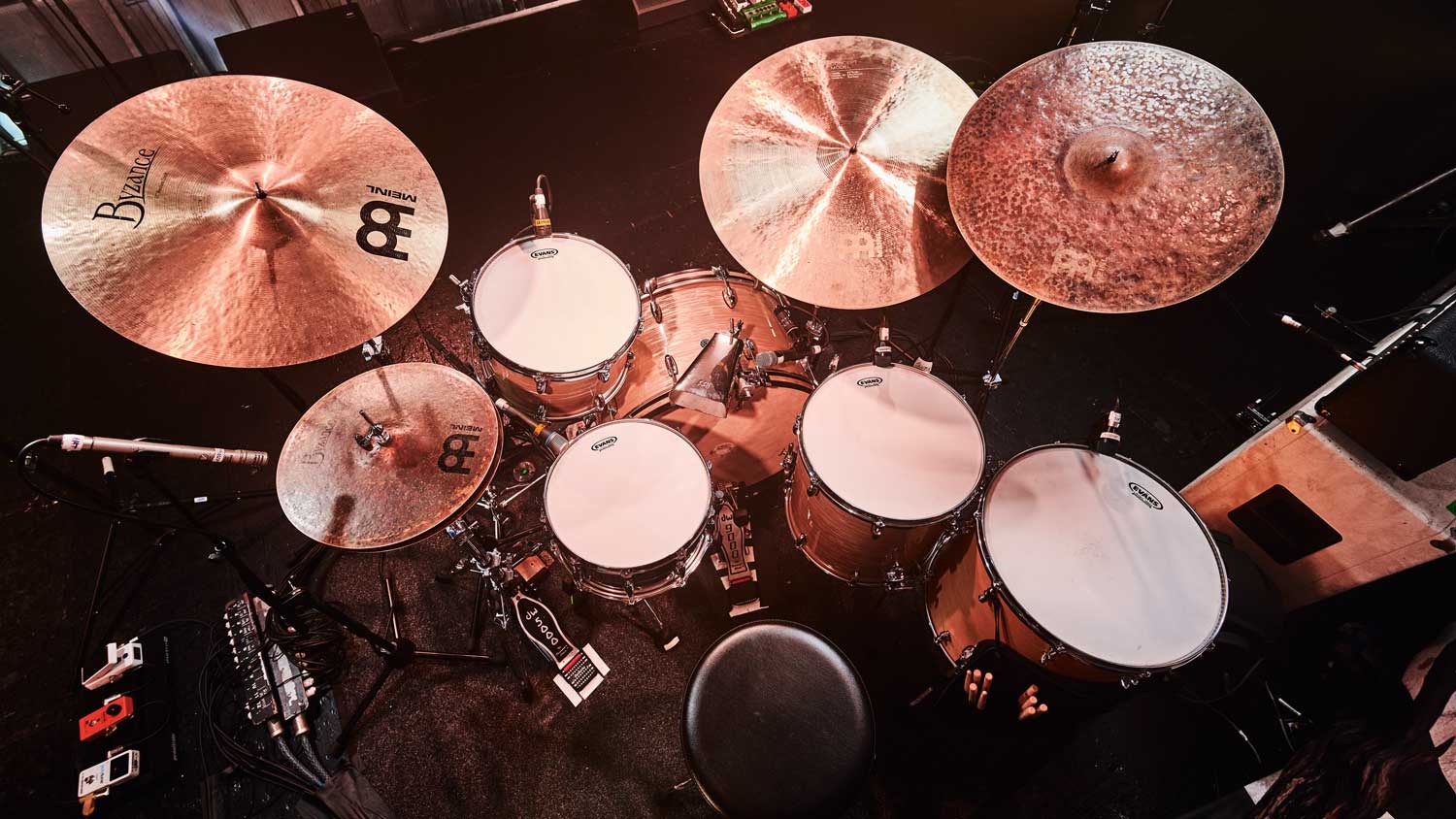Clutch's Jean-Paul Gaster: “For me, drumming is a meditation”
30 years into his career, Jean-Paul Gaster knows a thing or two about the business of making music

Reaching 30 years in any career is a major milestone, but doing it in the challenging music world is about as rare as a bass player who owns a car.
Maryland blues rock groovers Clutch started out with the sole intention of “recording some cool songs and playing some cool shows”.
The cult status and success they’ve forged through the decades between ’93’s Transnational Speedway League and 2018’s phenomenal Book Of Bad Decisions has been an unexpected, gratifying bonus.
Chatting to founder drummer Jean-Paul Gaster it’s clear that he and Clutch – completed by guitarist Tim Sult, bass player Dan Maines and frontman Neil Fallon – are uncomfortable sitting still.
From pushing their playing forward (JP learned mandolin to help write the new album) to taking band business into their own hands (the quartet set up their Weathermaker Music label in 2008), with each step in their career Clutch have been committed to the evolution of the band.
Take their latest album Book Of Bad Decisions, for example. Instead of returning to the familiar territory of producers Machine or J Robbins, with whom they’ve created fantastic music in the past, Clutch took another bold leap forward, entering the studio with renowned country producer Vance Powell for the first time.
Everything from the recording process to Powell’s miking approach was new to JP and the gang, but the resulting album was an instant classic that perfectly captured the band’s potent live energy.
Want all the hottest music and gear news, reviews, deals, features and more, direct to your inbox? Sign up here.
Here, JP tells us about the fascinating process of recording his famous groove on Book Of Bad Decisions, the positive impact of working with musicians outside of Clutch and why it’s about the journey rather than the destination.
For Book Of Bad Decisions you recorded with Vance Powell for the first time. What inspired you to work with him?
“We were looking to do something new, something different. Vance Powell’s name kept popping up.
“My brother-in-law is a big fan of Chris Stapleton and he played his record The Traveller quite a bit. I was very impressed because it didn’t sound like other country records that I had heard before.
“Right away my ears perked up to Vance Powell. There was another song that came up one evening on Spotify by The Dead Weather. We found out that Vance had recorded and produced that as well.
“Being the drummer in the band, I’m also the default recording engineer when it comes to making demos, so I find myself checking out videos on YouTube of different producers and engineers, just to get a feel for how they might mic the kit or how they might record a band.
“I stumbled across a few videos that Vance Powell had done and I was very impressed; not only with the way he worked with the band but the way he recorded.
“It was really a pretty simple process once we decided that would be a cool option to explore. I emailed him and he emailed right back.
“We started a line of communication between the two of us and he actually came out on the road for a few days and hung with the band which, actually, I thought was very important.”
That’s a cool approach. Has a producer ever done that with Clutch before?
“It was a pretty leftfield approach. I think other producers we’ve worked with prior to that, whether that’s J Robbins or Machine, they had a feel for what the band was about live.
“Vance was coming in sort of fresh. I’m not sure how much Clutch music he had heard prior to me reaching out. He’d certainly heard of the band, but he didn’t know much about our catalogue or what we do live, and obviously that’s really crucial.
“I think more than anything we were trying to capture that energy that we have live. That’s definitely where we feel the most comfortable. I think Vance’s time on the road gave him some insight as to how he might record the band and bring some of that energy to the recording.”
The whole process is quite fluid all the way up until we record. Nothing’s totally set in stone
Book Of Bad Decisions is definitely a live sounding record. How did you and Vance go about capturing that?
“The most obvious thing is that we played in the room together. We had done that to varying degrees on past records, but it was refreshing because we were looking for takes of the band, rather than trying to just zero in on drum takes.
“We would play the song maybe two or three times and eventually we would pick our favourite. It was amazing how quickly we were able to put down the basic tracks for 15 songs. I imagined us being in there slugging it out for several weeks.
“It was really a very natural experience. [Vance] was good at being able to judge when the band had hit the high-water mark as far as that performance or that song.”
A lot of what you play in Clutch is feel-led. Do you labour over tempos to get the feel right?
“We’re very aware of the tempo from the very beginning. As soon as a new riff gets introduced to the room I immediately try to work out what that tempo is.
“I’m sure we’ve all experienced a situation where we get together with our friends and start jamming this new idea and it just sounds incredible.
“Everybody’s very excited about it, then maybe you go and record that idea and for whatever reason some of the original intent or the things you thought were great about that part, kinda go away. I think a lot of that has to do with tempo.
“As soon as these guys come up with a riff I try to identify what tempo that is and work from there. If we decide at some point that the tempo could be faster or slower then it’s a real conversation and we take it from there.
“This way there’s a real concrete idea. The tempo is something that’s very important to us and we think about that all the way through to the recording process.”
Clutch has a great live reputation. How much opportunity do you get to try out new songs live before committing them to the record, and how much do songs evolve once they’ve been recorded and played live for a while?
“In the period of time leading up to going into the studio we definitely play as many new songs as we feel comfortable with on that particular night. It’s very much a proving ground for us.
“A song comes to life when you get in front of a crowd. We make notes about that. We consider how the song felt live, how the vocal felt, we’re aware of that and a lot of times we do change arrangements.
“The beauty of it is that the whole process is quite fluid all the way up until we record. Nothing’s totally set in stone. We certainly have an idea of what we’re trying to accomplish but we really try to keep an open mind because, at this point, it’s important for us to feel comfortable with trying new things.
“Once the song gets recorded and we go back out on the road and start playing it, the song evolves as well. I tend to play stuff differently from night to night.
“Sometimes, I’ll swing a song more, sometimes I’ll play it a little more straight depending on what I was listening to that day or the evening before. Or maybe I was listening to a drummer that I was particularly excited about.
“To be honest, I think about things in a different way. The drum parts that I record are such that you can interpret these things a little differently each night, and that keeps it exciting for me for sure.”

You learned the mandolin before the process for this record started and you contributed riff ideas for the album. Was it a challenging instrument to learn?
“It certainly was challenging to learn and I’m still not very good at it at all! But I really enjoy it. It definitely gives me some insight as to how these riffs come together and, more than anything, about song form. It’s been great.
“Actually, there are a few riffs that ended up on the record that began their life as a mandolin riff.”
Did the perspective of the mandolin have any impact on how you approached your drum beats?
“Yeah, definitely. Even if it’s a song that wasn’t necessarily a mandolin song to begin with, just having an understanding of the form, definitely influences the way I play drums.
“Understanding when we’re going from one part to another, changing keys, that kind of thing. I found it to be very helpful. Honestly, though, I’m still learning about that.
“I recently picked up a set of vibraphones and I’ve been enjoying playing those as well. I love the drums, I love this instrument and I think it’s important to expose yourself to as many things as you can and continue this process.
“This whole thing is a process and you never really arrive to where you think
you’re supposed to be. There’s stuff along that way that I think is more important than the actual end result.”
Your drum sound is superb on Book Of Bad Decisions. How did you and Vance go about capturing that?
“There’s a lot of ribbon mics on this recording. The main overhead mic was a stereo ribbon mic. We also put ribbon mics on the tom toms, which is something we hadn’t done before. That lends itself to the grit and the nastiness of the drum sound that we were able to make.
“The bass drum tuning this time was super low, to the point where I was surprised that something like that could work. Vance was very specific as to how he wanted the bass drum to sound.
“We worked probably the most on the bass drum. That continued to evolve as the recording went on as well. Tunings were super-low to the point where the tension rods were almost rattling and coming off the drum.
“Vance recorded it in such a way that really there’s a lot of low and sub in the bass drum that sets it apart from other records we’ve done.”
I think it’s very important for a band to be hands-on and be very aware of what’s going on. If you’re signed to a label, know about the label, know what’s going on over there, talk to them.
Does having a certain drum sound in your cans make you play a different way in the studio, for example, a more aggressive sound making you play harder?
“I think it does. Another cool thing along the same lines is that Vance would often put delays on the drums, just in the headphones, so you kinda have a feeling of this extra rhythm going on.
“He might put a triplet delay on a groove or one of those shuffle 16th delays. It’s not necessarily something that would be recorded, but really just something for the band to vibe on. That was very helpful, especially when we did down tempo tunes.”
What were some of your gear highlights in
the studio?
“I brought some of my Gretsch and Slingerland snare drums that I like. Vance had a 1946 Leedy 14"x5" drum that was really cool. We used that on ‘Hot Bottom Feeder’. For ‘Book Of Bad Decisions’ I used a 1939 14"x8" Ludwig & Ludwig snare drum.
“That’s a drum I picked up on eBay many years ago. I’m kinda blown away by how smoothly the drum still operates – the throw-off is beautiful. It’s a steam bent, solid shell snare drum, and that really delivered on the title track.”
It’s approaching 30 years since Clutch formed. The industry has changed dramatically in that time. Has your role in the band changed as a result?
“Not necessarily. The roles we took on early in the band we still do. I am a very hands-on kinda guy, I enjoy that part of it. Sometimes that can be frustrating, dealing with the business end of things. But that’s what’s required of a band these days.
“I think it’s very important for a band to be hands-on and be very aware of what’s going on. If you’re signed to a label, know about the label, know what’s going on over there, talk to them. These days it’s tough for rock bands. The more the band does for themselves the better off you’re gonna be.”
You’ve played with artists outside Clutch, such as Mark Stanley, Jay Turner and Mark Morton. What challenges did those sessions bring?
“Each one of those projects is unique. I take them on because they are different from Clutch. I had the opportunity to study with a guy named Walter Saab. He was an amazing teacher and probably the biggest takeaway that I had from him is that he wanted all his drummers to be prepared to play anything.
“I try and put myself in situations where I am uncomfortable, where I’m playing music that I’m not familiar with, or a style that I’m not necessarily well versed in. I think all the good stuff comes from that.
“I got the opportunity to play with Jay Turner who’s an amazingly creative bass player, a super-talented guy. He puts faith in me to play this music that he writes.
“For me it’s an honour to do something like that. I just take each one of these experiences as another step in this process. For me it’s all music, it’s all drums, it’s all time.”
Do these sessions subsequently influence your approach when you get back in the room with Clutch?
“Absolutely. It goes even further than that. I always try to spend a little bit of time practising on the road. On this run I have a practice pad and I make it a point to practise something different every day.
“For me it’s a meditation. It allows me to get in a frame of mind where I feel creative. It gets my brain working in a way where I’m thinking about music. Oftentimes, I’ll be practising a particular style or concept and I find that it really affects the way that I play that very night.
“You want to be able to practise things, not necessarily because you want to be able to play everything, but rather because you want to be able to play what’s in your brain and then have that come out onto the drums.”
Where do you get your inspiration for ideas?
“It happens all different ways. I might be listening to a record one evening and something will just pop into my head, a little lick or something. I’ll make a note of it and the next day I’ll spend time trying to figure out what it is I heard and I’ll try and incorporate that into a practice routine.
“I’m also a huge fan of YouTube. I love going on there and just picking a drum video. It’s pretty incredible that there’s such a wealth of information out there. In every little drum video there’s something going on.
“I’ll watch a Steve Gadd or Johnny Vidacovich video, then I’ll stumble across some kid who might just be learning the drums, but there’s something there that’s interesting and sparks something. Inspiration can come from all around you, you just have to be open to it.”
I'm MusicRadar's eCommerce Editor. In addition to testing the latest music gear, with a particular focus on electronic drums, it's my job to manage the 300+ buyer's guides on MusicRadar and help musicians find the right gear for them at the best prices. I dabble with guitar, but my main instrument is the drums, which I have been playing for 24 years. I've been a part of the music gear industry for 20 years, including 7 years as Editor of the UK's best-selling drum magazine Rhythm, and 5 years as a freelance music writer, during which time I worked with the world's biggest instrument brands including Roland, Boss, Laney and Natal.
